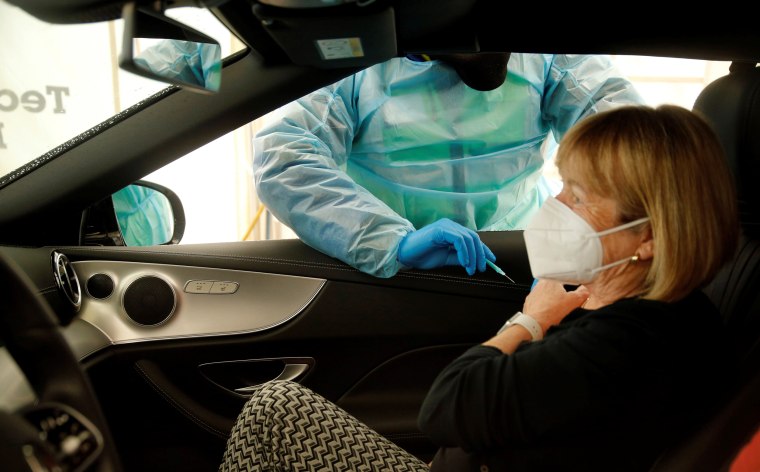Unusual blood clots should be listed as "very rare" side effects of the Oxford-AstraZeneca Covid-19 vaccine, Europe’s main drug regulator said Wednesday.
Emer Cooke, the executive director of the European Medicines Agency, said that the "benefits of the AstraZeneca overall outweigh the risks of side effects."
The vaccine has "proved to be highly effective," she said at a news briefing, adding that it prevented "severe disease and hospitalization and it is saving lives."
However, Cooke added that after a "very in-depth analysis," the regulator had "concluded that the reported cases of unusual blood clotting following vaccination with the AstraZeneca vaccine should be listed as possible side effects of the vaccine."
Because of a very small number of blood clots in younger people reported in the U.K., the Joint Committee on Vaccination and Immunisation, Britain's vaccines advisory body, said Wednesday that it was recommending that those under the age of 30 should be offered an alternative Covid-19 vaccine to the Oxford-AstraZeneca vaccine, where one is available.
More than 20 million doses of the Oxford-AstraZeneca vaccine have been administered in the U.K. so far, according to the separate Medicines and Healthcare products Regulatory Agency (MHRA).
In a separate statement, the EMA said that blood clots should be "listed as very rare side effects of Vaxzevria," the official name of the AstraZeneca vaccine.
"So far, most of the cases reported have occurred in women under 60 years of age within two weeks of vaccination," the statement added. "Based on the currently available evidence, specific risk factors have not been confirmed."
The announcement comes less than a month after the EMA said the Oxford-AstraZeneca vaccine was "safe and effective" to use. That statement was prompted after a number of countries, including Germany, France and Italy, suspended the AstraZeneca vaccine over concerns about blood clots in some recipients.
Most European countries that had put the vaccine on hold resumed administering it after European regulators said it was safe. Danish officials, however, said last month that they would prolong their suspension of the vaccine while they continue evaluating a potential link with blood clots, according to The Associated Press.
In Britain, which has given out more doses of the AstraZeneca vaccine than any other country, the medicines regulator also reported Wednesday that 79 people in the U.K. had suffered from rare blot clots after being vaccinated and 19 of those died.
June Raine, the MHRA's chief executive, said the agency's review had concluded that more work is needed to establish beyond all doubt that the vaccine has caused the side effects.
In any case, the rare suspected side effects have occurred in an “extremely” small number of people, she added.
Raine said based on the current evidence the benefits of the AstraZeneca Covid-19 vaccine against the disease and its associated risks hospitalization and death, continues to outweigh the risks for the vast majority of cases.
She said the risk of this type of rare blood clot is about 4 people in a million who receive the vaccine.
Meanwhile, Dr. Sabine Straus, the chair of the EMA's Pharmacovigilance Risk Assessment Committee, said at Wednesday's briefing that the currently available data "did not allow us to identify a definite cause for these complications."
Download the NBC News app for full coverage of the coronavirus outbreak
She added that "no specific risk factors could be identified based on the current data" and therefore the committee "cannot recommend any specific measures to reduce the risk."
"Most of the cases occurred in individuals below 60 years of age and in women," she said. "But because of the different ways the vaccine is being used in different countries, the committee did not conclude that age and gender were factors."
More research would be conducted, she said.
Cooke added the available data did not allow the EMA to draw any causal link with age groups, or whether male or female. "There is a lot more use in younger age groups in the U.K. than there is in the E.U. at the moment, and we will take this into account in our further evaluations," she said.
Also on Wednesday, South Korea said it will temporarily suspend providing AstraZeneca's vaccine to people under 60 amid the European review. It also approved the Johnson & Johnson shot in a bid to speed up its inoculation rollout.
